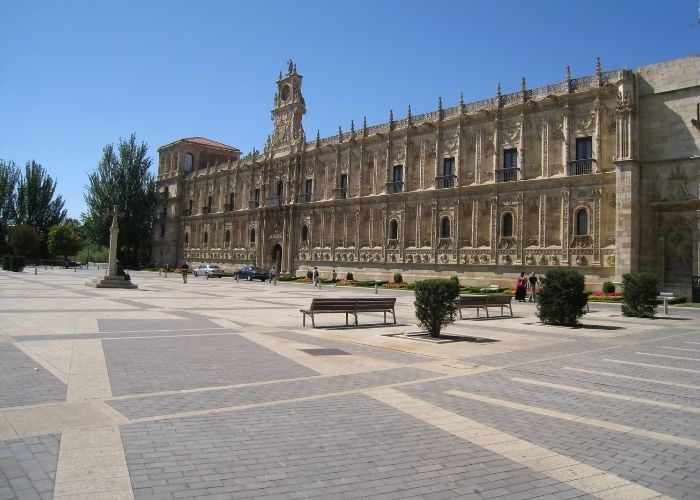Parador hotels are luxury state hotels located in beautiful historic buildings such as castles, monasteries and palaces. However, history often holds secrets. And this prompted a German tourist in León to force the hotel to recognise the past.
The Spanish state owns the chain, which aims to renovate historical and artistic heritage and preserve it for future generations. The Parador of León is located in the Monastery of San Marcos in the historic centre of León. A city in the autonomous community of Castile and Léon, in northwestern Spain.
The stately building was built in the Spanish Renaissance style in the 16th century. After a three-year renovation, this Parador is one of the most luxurious in Spain. The gigantic building also houses a consecrated church and a museum. It is one of the most important Renaissance monuments in Spain.
Eighty years later, the Parador of León still pays tribute to the republican prisoners of the San Marcos concentration camp. One of the 300 concentration camps under the Franco regime. However, the official Paradores website still lacks any reference to the historic building’s past.
Furthermore, the official hotel website as well as other booking sites offer no information about what happened 80 years ago in the now so impressive and luxurious state hotel.
‘Forgotten’ concentration camp
Spanish writer and journalist, Carlos Hernández spent over three years researching Franco´s concentration camps. And in the process of writing his book, The concentration camps of Franco, he interviewed a German couple. They had booked a holiday at the Parador of León without realising what the building had been.
To Wilfried Stuckmann, who in 2014 spent two nights in the Parador with his wife, this was discovered with the great anger and indignation. It was during a visit to the old monastery, he accidentally came across information that showed that the monastery had been a concentration camp. Between 1936 and 1940, during the Spanish Civil War, an estimated 20,000 Republicans were held captive. And between 1,500 and 2,900 inmates died there through illness, abuse or murder.
“We were in shock,” Stuckmann tells the Spanish news site El Diario. “If we had known this, we would have chosen another hotel”.
There is a lot of obscurity about the past and the events during and after the Civil War. People often kept silent about being able to work more quickly on a better future after the period that so horribly divided the country into political opponents. That is why the ARMH submitted a request to Paradores to place an information board in the hotel, in memory of what happened eighty years ago.
Behind closed doors
Now, in 2021, there is an information panel. But this isn’t exactly an eye-catcher now. “It is too small and not visible to the public,” sighs Emilio Silva, chairman of ARMH. The panel is behind a closed door that is only opened when a visitor asks. However, the ARMH will not stop at this and will file a complaint with Paradores. The organisation believes that the panel should be given a prominent place in the hotel. In addition, there should be an information block about the concentration camp on the official website of the hotel, Silva said.
The tribute was held privately and could be followed by the media via a live stream. In front of 101-year-old Joseph Sala, the last survivor of the San Marcos concentration camp, Paradores director Óscar López said: “We are not hiding the past.” The seclusion of the meeting, the silence on the website and the fact that the information board is kept out of the picture, however, do not bear witness to this.
Don’t sleep but remember
Wilfried Stuckmann still believes that the Parador of León should not be a hotel, but a memorial to the victims of the concentration camp. “We must never forget war crimes, anywhere in the world,” emphasises Stuckmann.


